Welcome to Matrix Education
To ensure we are showing you the most relevant content, please select your location below.
Select a year to see courses
Learn online or on-campus during the term or school holidays
Learn online or on-campus during the term or school holidays
Learn online or on-campus during the term or school holidays
Learn online or on-campus during the term or school holidays
Learn online or on-campus during the term or school holidays
Learn online or on-campus during the term or school holidays
Learn online or on-campus during the term or school holidays
Get HSC Trial exam ready in just a week
Get HSC exam ready in just a week
Select a year to see available courses
Science guides to help you get ahead
Science guides to help you get ahead
Struggling to balance your study life and personal life? Well, in this article, our Matrix+ student shares her subject tips and tricks to help you succeed academically and manage life!

Join 75,893 students who already have a head start.
"*" indicates required fields
You might also like

Join 8000+ students each term who already have a head start on their school academic journey.
In this article, Year 12 St John’s College and Matrix+ Scholarship student, shares secrets for how to Ace Your Subjects and Balance Your Life.
Prinica Saran
St John’s College
Doctor of Medicine, Monash University
In 2021, I will finally be entering my HSC year – the last year of my high school career! From attending a regional high school in the central west, my goals to move to the bustling city certainly don’t overshadow my interests in partaking in the small festivities of my lively hometown. The heat of the weather encouraged my love for the water, and called for leisurely pool swims and evenings walking my dogs around the gully.
In regards to academics, I have a deep passion for English. English has always been one of, if not my most, favourite subjects throughout my schooling life. I love to write creatively, and read novels in my spare time. If asked my favourite author at the moment, I would definitely say Stephen King, but my childhood was strongly moulded by Enid Blyton who appealed to my delight for adventure and the wild imagination.
What’s so interesting about our imagination is its infiniteness. How are our ideas conjured? What fuels our scope of language and thought?
It is this very fascination which garners my interest into the world of science! I believe it always helps to understand the way in which we live and interact, and that we are able to expand our vision because of it!
Currently, I study on campus at a regional high school of about one thousand students in the Central West. Apart from academics, I take leisure in swimming, and when I have time, to play the piano. Having previously participated in squad swimming – my time was spent training in the afternoons, partaking in relays and other fun events!
In Year 10, I acquired a position as a barista at a local cafe, and often work two to three shifts a week.
When it was time to elect my subjects for Year 11 2020, I chose subjects which I believed would scale higher for my ATAR.
My elected subjects for Year 11 were:
Now taking a look at the array of subjects, it appears quite challenging, and it proved to be just. Having undertaken an accelerated course, I had to juggle two timetables, two different year groups, and two different goals. One was to study to both attain a Band 6 for my HSC and good marks for my preliminaries, and the other was to maintain a sociable life.
Time management was a key skill I had to harness to surpass both of these challenges. But of course, as many high school students would agree, too much is simply too much. The workload heavily tilted my balance of academics and external school life and was one of the primary reasons which led to my discontinuation of the Physics course. Now this situation varies from one person to another.
Regardless, making choices in high school, particularly in Stage 6 will feel like a be all or end all at the beginning – but my best advice to you is to strive for your best in all areas, but remember to take a breather and try to maintain optimal mental health.
Extension English – The Extension English course targets the imaginative and multimodal aspect of literary study; much of which I enjoyed researching and crafting responses for.
Chemistry – Chemistry is an interesting subject which looks into the existence and interactions of human beings at a molecular level. Though it appeared to be tricky at the start; once I caught hold of the concepts and carried out my research efficiently, it became much easier.
Studies of Religion – Studies of Religion is an amazing course to elect if you’re fascinated by the socio-cultural and religious differences between communities in the past and present world. The coursework can be worked through much more efficiently, and understood better if you study the definitions of terms, complete textbook work and gather evidence!
Extension Maths – Mathematics is not everyone’s cup of tea – and that’s ok! When comparing Extension Mathematics to the Advanced Course, there are some key differences that one must consider. First of all, the amount of content covered. The Extension course covers much more complex content in the same topic as you would work through in Advanced.
Though this may help in understanding Advanced more (which was the case with me), the course itself can pose difficult when trying to remember key concepts and working out methods to answer the more challenging questions. There are ways to surpass these obstacles though!
For starters, the Matrix+ course itself helped me understand the concepts much easier with their substantial video lessons covering the theory, and following with practice questions.
Another way I attempted to improve was to download HSC past paper questions from the NESA website and answer them. These really helped me familiarise myself with the type of questions I may encounter in the upcoming HSC!
Physics – My passion does steer towards the more creative side and so I personally believed that out of all the three Science courses, Physics proved to be the least effective to gauge my interest and the most challenging to partake in. Even though I discontinued the course, there were many resources which helped me get through it all!
1. Build your perspective by reading more
When taking each of the English courses, I came to realise that it really is all about having a perspective, and of course, an expansive vocabulary.
For the majority of it, essays, creative writing tasks and textual studies all require you to have a perspective. Many of the questions you will receive will probably start along the lines of To what extent… or Explain why…
This is because the markers want to see how you apply your knowledge and understanding to various issues and features of both past and present society.
Success in English relies heavily on your understanding of the text and its meaning, your ability to analyse literature and to create a response appropriate to the modern world. Reading articles, novels, watching documentaries and the news all contribute to the construction of your perspective.
Get ahead with Matrix+ Online
Expert teachers, detailed feedback and one-to-one help. Learn at your own pace, wherever you are.
2. Take advantage of the Matrix+ feedback system
When using Matrix resources for English, such as the Q&A board or the theory book, I was able to improve one of my biggest weaknesses: writing concisely.
I tend to ramble in essays, or write sentences way too long to read effectively.
By submitting the writing tasks, I had the opportunity to gain even more feedback than what my other classmates received and gave me a leg up in improving my writing skills.
Criticism is inevitable, so you might as well harness whatever you can and use it for your benefit.
3. Write by hand
Writing notes for English can sometimes be confusing. I often found myself typing them in a google document, and then losing them halfway through the year.
However, as easy as typing may be, for English, I recommend handwriting, pen to paper.
This gets your hand used to writing, and strengthens your muscles for when exam time comes up and you have 5 minutes remaining to finish a paragraph and a conclusion.
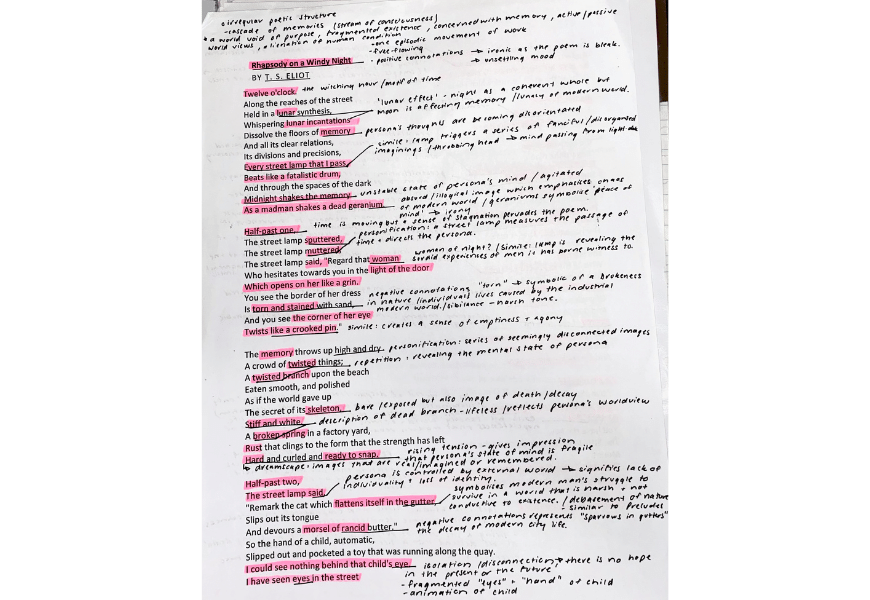
3. Know your rubric
Since English doesn’t really have a dot point syllabus, and instead has a module descriptor, or rubric, it is important to know it back to front.
The rubric is telling you what they want you to know and accomplish.
A good way to do this is to print off a copy of the rubric and highlight any phrases which you think are important. Matrix Education is a great resource to help annotate and provide meaning for some concepts that don’t make sense.
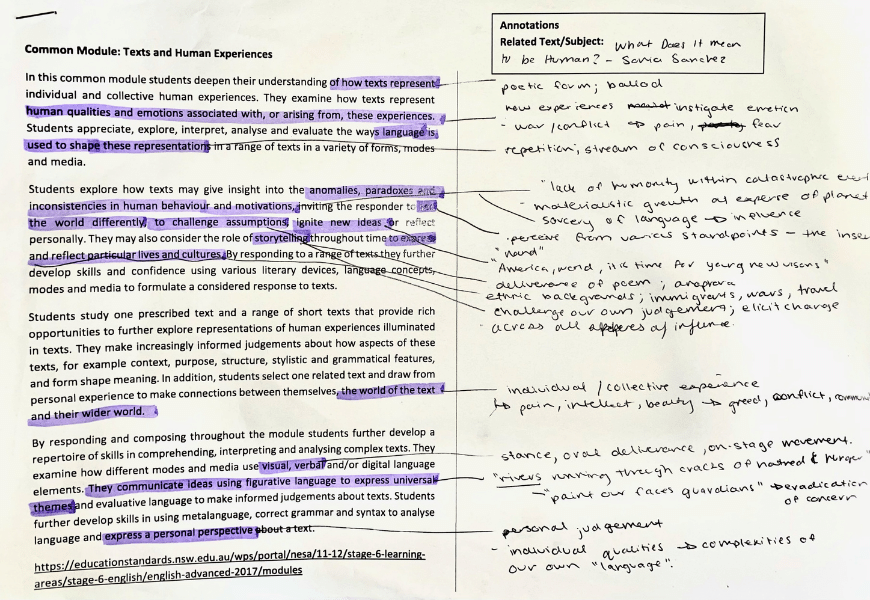
Another tool is to make a table of these important lines/phrases which you can look at, and in future apply to your essays or reflective pieces.
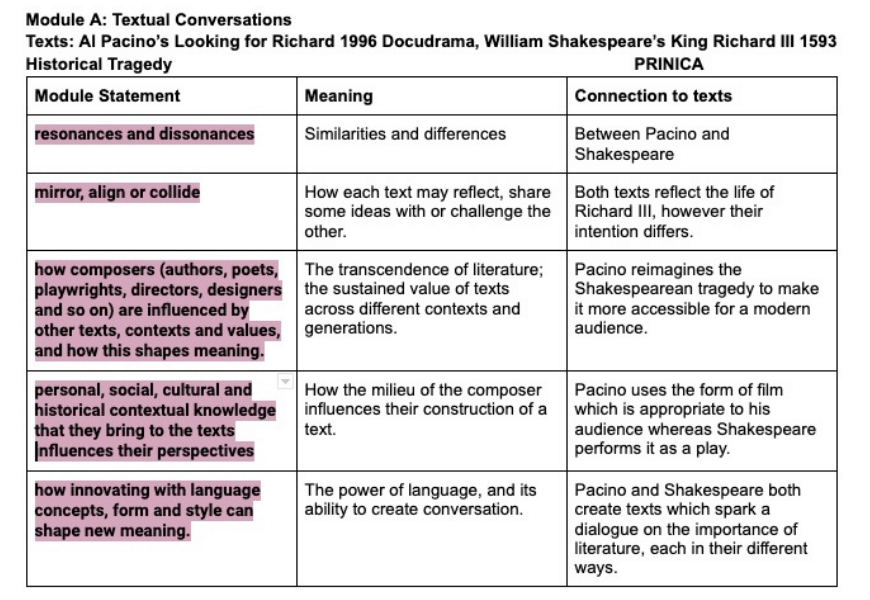
1. Practice more
Studying for Maths is both a quantitative and qualitative effort. The more practice you do, the better you will become at it. When studying for Maths, I usually attempt the textbook questions, and then to get a taste of the real deal, some past paper questions.
Matrix+ also provided topic tests and practice questions which you can get detailed step-by-step visual explanations for the answers.
Again, the Q&A boards are an effective way to gain an insight into what you need help with and what to spend more time on. This not only helps in managing your time wisely, but also is a great way to cover useful techniques when in exams.
2. Keep a book of key ideas
Personally, I don’t write notes in Maths. Rather, I keep a book of key ideas and examples from the textbook which I can later add simple definitions to and look back on if a concept becomes foggy when studying and practising questions. If I answer a question incorrectly, I make sure to get help on it whether it’s from my teacher, the Matrix+ tutor or even a fellow student.
3. Teach others
One of the most valuable opportunities to solidify your understanding of a concept is to explain it to someone else.
If done effectively and concisely, and they come to understand it as well – you know that you’ve got the hang of it and it’s time to move on to other concepts.
I also ensure that at the start of every Maths book I use, or in my folder, that I possess a copy of the formula sheet. This helps when answering questions, as well as helping get used to what will be available come exam time.
1. Know your modules
All the Sciences are heavily syllabus based.
Every concept, question and experiment that you come across will directly relate to the syllabus.
That’s why knowing what modules you are learning, and the different inquiry points for each are vital to being successful in any science.
Matrix+ offers visual explanations on each of the dot points, and like Maths, goes through each concept with elaborate detail. With something like Chemistry, Matrix+ assisted my understanding in the working out of equations as well as the significant links between a concept and a practical investigation.
This helped me enormously when writing discussion reports for school, and allows me to answer practical-based questions effectively.
2. Categorise your notes according to dot point and module
When studying for any of the Sciences, it’s easier to locate your notes if they are categorised according to dot point and module.
That way, you are better able to make relationships between different experiments you may have done, or target information for an upcoming topic test.
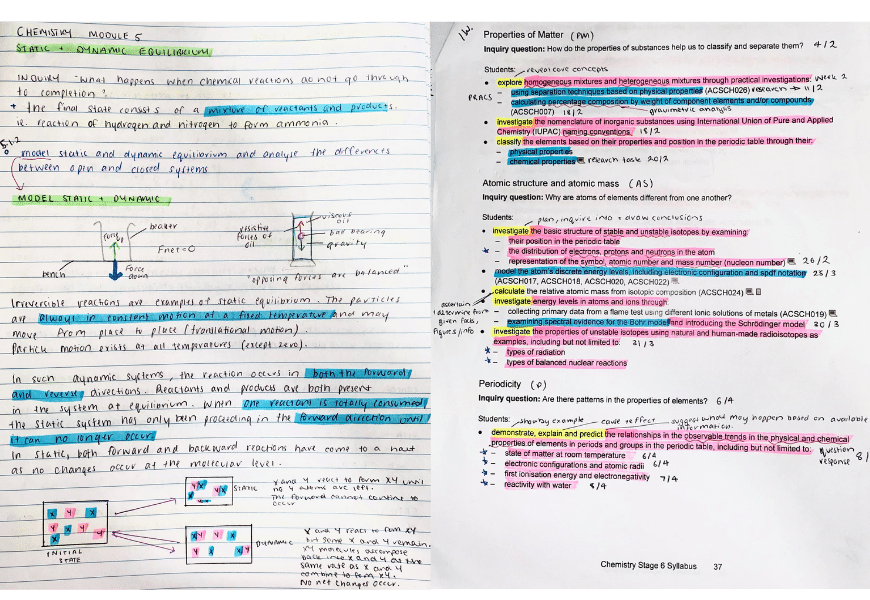
3. Do past papers to build your foundation
Past paper questions are also important to keep in mind when studying for examinations, so as to build a foundation for understanding the level at which you will be assessed.
4. Draw a mind map of the syllabus
Drawing a mind map of the syllabus is something which has been emphasised upon by my teachers, and which helped me visualise the course much easier.
Here is an example of a mind map I drew in class for Module 1, Properties and Structures of Matter. I colour coordinated each inquiry point and the concepts related which aided in my organisation of notes.
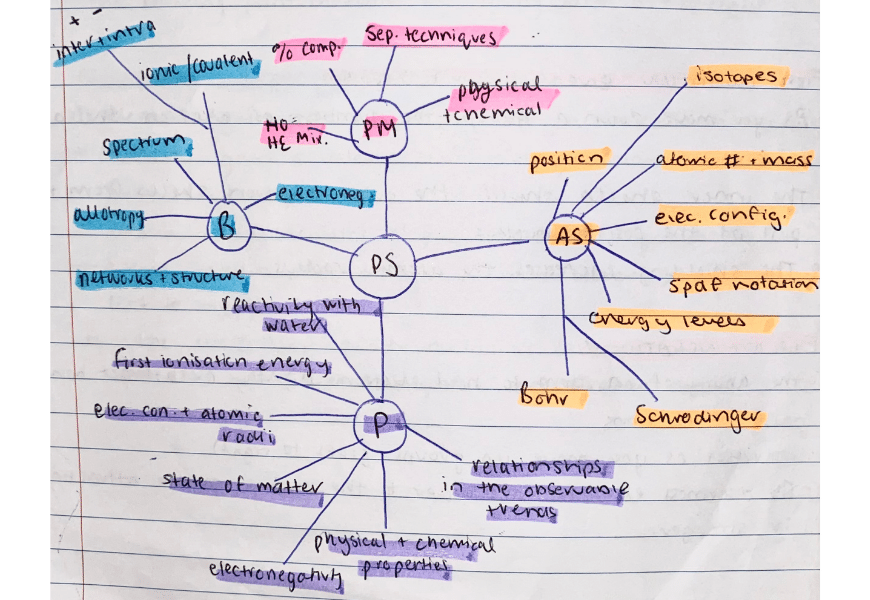
Studies of Religion is such an interesting course which delves into one of the most influential factors of societal segregation.
One of the biggest misconceptions is that Studies of Religion is a ‘bludge’ or easy subject. I’m more than happy to debunk that theory.
Studies of Religion is similar to English in a way that you’re required to write an essay in your exam, and that evidence is crucial!
However, people tend to forget that the course consists of more than one culture, and thus, more than one language.
In Australia, we are lucky to be exposed to many different cultures and traditions that can expand our knowledge and understanding of the greater world.
However, it can still be challenging to write about a whole new religion which is accompanied by a range of different practices, values and beliefs.
This is where the syllabus, and the textbook become a sort of ‘sacred text’ to your study, where most, if not all your information stems from.
One of my biggest regrets in the past year was underestimating the level of difficulty Year 11 was. I left about 1 week of preparation before the initial assessments week to cover all the content needed for 13 units of my subjects. As you can probably imagine, it was arduous to say the least.
Like many high school students, I had the usual mental crisis of scurrying around trying to study, and came out of it exhausted, and low. It was then that I realised that I had to change some things I did, the way I did them and make some sacrifices because in the long run, it was purely for my benefit.
Balance and preparation is key in all you do, so try not to skip out on it because you’re the only one who will reap the benefits.
1. Plan and Prepare:
Plan in your schedule, your phone’s notes or on your hand in ink. With success, comes preparation. Year 11 is a big leap from Year 10.
The workload is heavier, the teachers expect more, and with greater power in the school, comes greater responsibility.
It’s your duty to accept and prepare for those responsibilities, whether it’s to complete an assignment, attend a shift at work or partake in a sporting relay, and to do it all credibly.
2. Compile notes according to the syllabus:
This helps recognise and target certain outcomes which may appear in exams. It also makes note-taking much more organised, and effective, particularly when looking back during study.
3. Have fun:
Students may stress themselves out way more than necessary during Year 11 because of the giant leap it is from junior school. However, it is important to take time aside from studying, and academics, and pursue other interests to lead a healthy and happily balanced life. Listen to music, join a sport or a play – do what makes you feel relaxed, and helps you concentrate.
1. Let shyness take over:
Sometimes it can be daunting when you don’t get a concept, or you think you misheard a point of discussion but you don’t want to raise your hand, or ask a question in the forum But believe me – there is definitely someone else that is worrying or unsure about the same thing!
Try to engage in group discussions, or to clarify something in class you don’t completely understand; not only are you helping yourself but others around you!
2. Not Prioritise:
Homework may seem unnecessary but it’s important to realise that it’s only for your benefit! It’s often the amount of it that turns us away, however, when it comes to time management, attempting what challenges you can be advantageous and you’ll be completing it in a more efficient way.
Prioritising yourself when under stress is the first step, however, when it comes to smaller decisions such as watching TV or completing an assessment – its better to choose whichever will help us in the long run.
2. Underestimate and Procrastinate:
It’s often our own selves which betray us come study or exam time. It’s always better to think forward, and practically to perform better, otherwise you’ll be left behind. If you need to catch up in class, don’t underestimate the importance of that particular topic.
Everything we learn in class, or that is taught to us, plays a role in some bigger picture. That’s why we need to teach ourselves to be responsible when it comes to our duties and tasks as students – so we can be prepared for the bigger world out there.
Get ahead with Matrix+ Online
Expert teachers, detailed feedback and one-to-one help. Learn at your own pace, wherever you are.
Written by Guest Author
We have regular contributions to our blog from our Tutor Team and high performing Matrix Students. Come back regularly for these guest posts to learn their study hacks and insights!© Matrix Education and www.matrix.edu.au, 2025. Unauthorised use and/or duplication of this material without express and written permission from this site’s author and/or owner is strictly prohibited. Excerpts and links may be used, provided that full and clear credit is given to Matrix Education and www.matrix.edu.au with appropriate and specific direction to the original content.